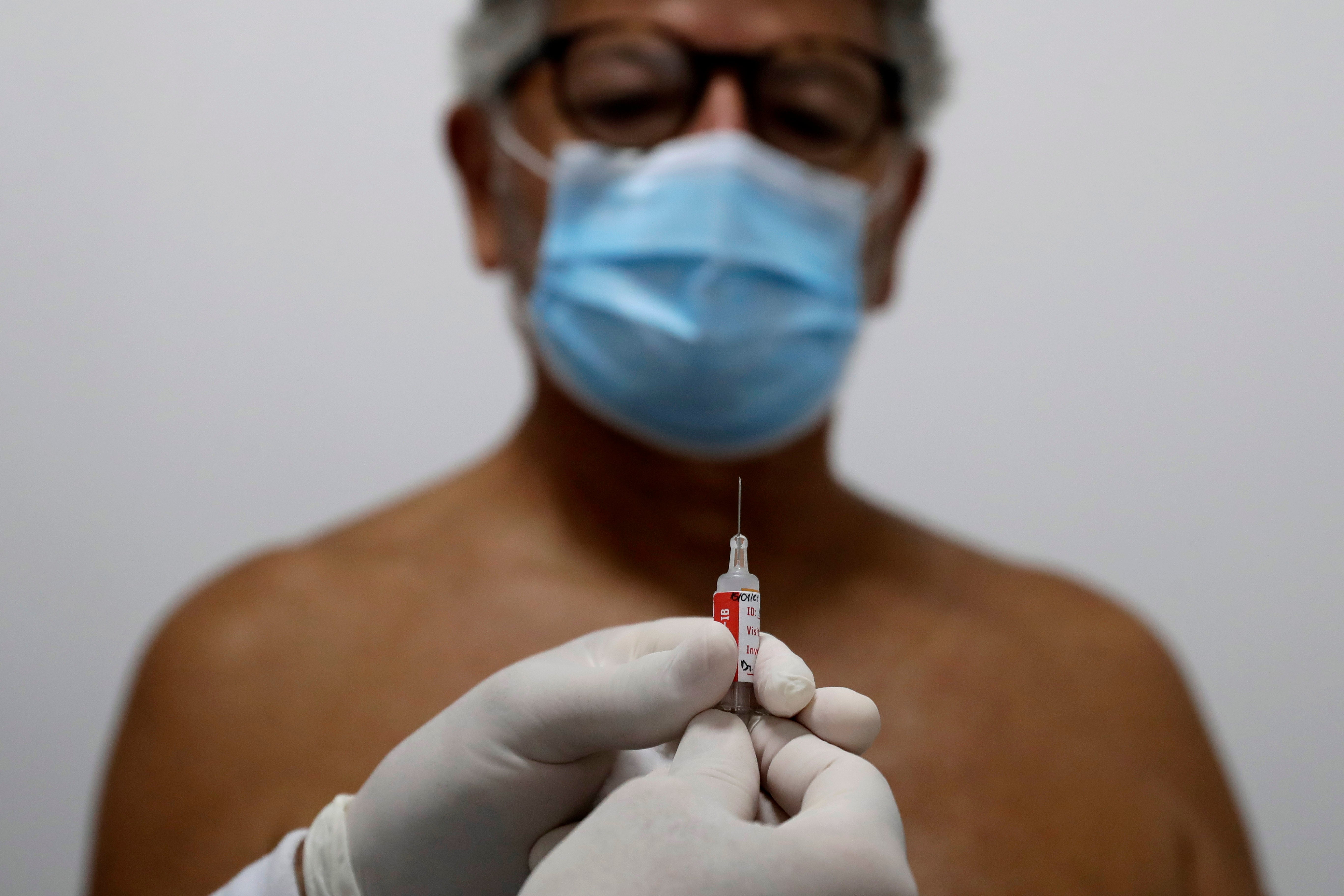Brazil’s health agency approves the use of two vaccines
Brazil’s health regulator on Sunday approved the urgent use of coronavirus vaccines made by Sinovac and AstraZeneca, enabling Latin America’s largest nation to begin an immunization program that’s been subject to months of delay and political disputes

Your support helps us to tell the story
From reproductive rights to climate change to Big Tech, The Independent is on the ground when the story is developing. Whether it's investigating the financials of Elon Musk's pro-Trump PAC or producing our latest documentary, 'The A Word', which shines a light on the American women fighting for reproductive rights, we know how important it is to parse out the facts from the messaging.
At such a critical moment in US history, we need reporters on the ground. Your donation allows us to keep sending journalists to speak to both sides of the story.
The Independent is trusted by Americans across the entire political spectrum. And unlike many other quality news outlets, we choose not to lock Americans out of our reporting and analysis with paywalls. We believe quality journalism should be available to everyone, paid for by those who can afford it.
Your support makes all the difference.Brazil’s health regulator on Sunday approved the urgent use of coronavirus vaccines made by Sinovac and AstraZeneca, enabling Latin America’s largest nation to begin an immunization program that’s been subject to months of delay and political disputes.
Brazil currently has 6 million doses of Sinovac’s CoronaVac vaccine ready to distribute in the next few days, and is awaiting the arrival of another 2 million doses of the vaccine made by AstraZeneca and partner Oxford University.
On Saturday night, the health regulator Anvisa rejected an application for use of a Russian vaccine called Sputnik V, submitted by Brazilian company União Química. Anvisa said it didn’t evaluate the application because it didn’t meet minimum requirements to start an analysis.
Vaccination in Brazil is beginning later than neighbors such as Argentina and Chile despite a robust public health system and decades of experience with immunization campaigns. The process to present and approve the COVID-19 vaccines was fraught with conflict, as allies of President Jair Bolsonaro sought to cast doubt on the efficacy of the Sinovac shot backed by his political rival, Sao Paulo state’s Gov. João Doria.
“The rivalry between Brasilia and the state governments prevented any cooperative work,” said Maurício Santoro, professor of political science at the University of the State of Rio de Janeiro. “The governor lost the leadership position, but made Bolsonaro act more quickly to guarantee the start of vaccination.”
The vaccination priority will be health professionals on the front line against coronavirus. Vaccination by the federal government could begin on Wednesday, Health Minister Eduardo Pazuello said last week. Sao Paulo state started immunization Sunday after Anvisa’s decision. As more doses are available, immunization will be extended to others including the Indigenous population, people over 60 years of age and people with pre-existing diseases, according to the vaccination plan presented by the federal government.
The Brazilian government is considering extending the time between the application of first and second doses of immunizers to reach more people quickly, Health Minister Eduardo Pazuello said in Manaus on Monday.
The Amazonian city of Manaus, the first state capital whose health system collapsed in 2020 due to the pandemic, is once again experiencing a critical situation, with a lack of oxygen in some hospitals. Doctors in the Amazon rainforest’s biggest city are having to choose which COVID-19 patients can breathe amid dwindling oxygen stocks.
Hospitals in Manaus, an isolated city of 2.2 million people, have admitted few new COVID-19 patients, causing many to suffer from the disease at home and some to die. Other Brazilian states have offered to receive patients and decongest Manaus’ health system.
Bolsonaro, who contracted COVID-19 and said in the past that he does not plan to be vaccinated, has raised suspicions about the effectiveness of the Chinese vaccine, which will be produced locally by an institute that depends on the Sao Paulo government. Gov. Doria has criticized Bolsonaro’s handling of the pandemic.
The Sao Paulo government had generated mistrust with a confusing announcement about the results of the CoronaVac vaccine. Doria announced on Jan. 7 that the efficacy of the immunizer was 78% for mild patients and 100% for severe cases. One week later, in a press conference in which the governor was absent, officials from his government said the clinical efficacy of CoronaVac was only about 50%.
Some scientists warn that not enough data has been published about the effectiveness or safety of Sinovac’s vaccine. It has yet to be tested in tens of thousands of people in the kind of rigorous study considered necessary before being licensed for wide use.
Global health authorities have said any vaccine that is at least 50% effective would be useful. Indonesia, China and Bolivia have granted conditional authorization for CoronaVac.
Despite the doubts and the discredit of some supporters of Brazil’s president towards vaccines, many people in Brazil hope to get the vaccine.
“I plan to get vaccinated and my family too,” said Thiago Salgado, 39, a music teacher.
The government’s projection is to end 2021 with at least 354 million doses between contracts for the two vaccines, and those that will be produced locally. If this figure were applied, it would be enough to fully immunize at least 80% of Brazilians.
Raquel Esteves, a 74-year-old retiree who supports Bolsonaro, lives in Rio de Janeiro and said she was not anxious to get vaccinated, noting questions about the efficacy of the Sinovac vaccine.
“I have been inside my house for a year and a half, I can stay without problems for another two or three months,” said Esteves.